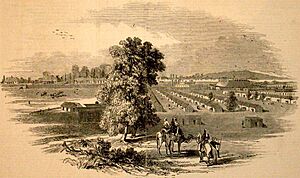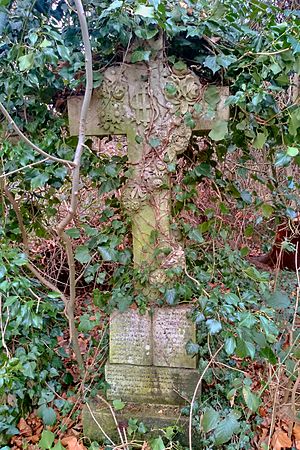George Powell Thomas facts for kids
George Powell Thomas (born 1808, died 1857) was a brave soldier, a talented artist, and a poet. He was a Major in the 3rd Bengal European Regiment. He sadly died during the Indian Rebellion of 1857, also known as the Indian Mutiny, at the Battle of Agra. People described him as a very courageous and brilliant person.
Contents
Early Life
George Powell Thomas was born on August 26, 1808. His birthplace was Bahramghat, close to Lucknow in India. His father, Lewis Thomas, was a Major General in the Bengal Army, part of the East India Company. His mother was Maria Frances.
Military Career
George Powell Thomas began his military career in 1825. He worked in the Thuggee and Dacoity Department in 1835. This department helped stop groups of robbers in India. From 1835 to 1840, he also worked as an assistant commissioner in the Central Provinces.
He became a Captain with the 64th Bengal Native Infantry. He helped in the relief effort at the Battle of Jellalabad in 1842. He also served in Afghanistan during the First Anglo-Afghan War. There, he led a group of soldiers called Jezailchees under General Sir George Pollock. He was promoted to Major in 1851.
Service in the Crimean War
When the Crimean War started, Major Thomas was home on sick leave. He asked to lead a regiment in the Turkish Contingent. This was a group of soldiers helping the British and their allies. He commanded a regiment of Bashi Bazouks in Turkey. The Queen gave him the special rank of Lieutenant-Colonel there.
Later, he went to the Crimea as a volunteer. He was present when Sevastopol fell in 1855. For his service, he received the Crimea medal.
Battle of Agra
On July 15, 1857, a battle took place near Agra. Major Thomas was already ill, but he still led five companies of his regiment. He was badly wounded in his foot. His horse was also shot three times and fell on him, hurting his head. He died from his wounds on August 4, 1857, inside the fort at Agra. He was buried in the fort's cemetery.
Art and Poetry
George Powell Thomas was a very talented artist. He created 'Sketches of the Himalayas'. In 1846, he published 'Views of Simla'. This book had twenty-four hand-coloured pictures. People loved his artwork. A review in The Spectator newspaper said his sketches were "spirited and effective." They showed his quick and strong artistic style.
In 1847, he also published a book of poems. These poems were described as "very graceful" and "full of feeling and thought." His poems were even included in other poetry collections, like "The Book of the Sonnet" (1867).
His Poems
Here are some examples of his poems:
|
To Constance, in absence THOU art not here! And ere we meet again, Long years may pass away, and even thou, My fair young bride, — some shadows on thy brow, The tokens some of time and some of pain, May, ere that hour, have stolen in, to stain The fairest face that e'er won lover's vow. What matter ? Be thy heart as it is now; Let that its freshness, beauty, truth retain, And something of its own sweet power to adorn Whate'er it loves, with such divinest light As hovers o'er the mountain-top at morn, Yet makes the poorest blossom heavenly bright: Blest in those arms from which I now am torn, I shall note nothing, then, of time or blight. |
To Constance, written in absence Knowing, too surely, that whatever years Fate may allot us, of united bliss, There still must come a parting wet with tears, Alas, sad, awful agonizing kiss, Which deathless love, and death-bed hopes and fears, Must wring with thoughts of other worlds and this; And knowing that each hour that moment nears, Though its approach by mercy shrouded is, —Oh, I must hold my loss of every day Which basking in thy presence doth not bless, A fine as harsh as victims ever pay, Or tyrants ever wring from weak distress; A fine,—by each hour pass'd from thee away,— That makes my lawful span of life-time less! |
Jumnootree; A peak in the Himalyas, twenty-five thousand feet above the level of the sea. SHARP, clear, and crystalline, cleaving the sky In twain, it towers for ever and alone, Save that about its feet the tall hills lie, Like slaves around some mighty despot's throne,— While evermore, beneath its cold stern eye, The short-liv'd centuries have come and flown, And stars that round its head untiring fly, Confess its glories ancient as their own !- The eagles shun it in their highest flight; The clouds lie basking 'neath its eminence; Nought nears it but thin air and heaven's sweet light, Nor not a sound for ever cometh thence, Save of some avalanche from its summit riven, Or thunder-tempest on its breakers driven! |
He also wrote plays. His plays, like Michele Orombello, or the Fatal Secret and The Assassin, or the Rival Lovers, were known for their strong plots. They explored emotions and were considered important in Anglo-Indian dramatic literature.
Family Life
George Powell Thomas married Albina Grace Andrews on August 1, 1831, in Dacca. Albina was born in 1811 in Richmond.
They had several children:
- Marian Albina (born 1832 in Dinapore, Bengal)
- Charles Lewis Stratford (born 1833 in Dinapore, Bengal)
- Stratford Powell (born 1837 in Saugor, Bengal; died 1839)
- Charles Frederick (born 1843 in Subathu, Bengal)
- Montague George (born 1844 in Calcutta, Bengal)
- Alice Constance (born 1846 in Bath, Somerset)
- Alfred Campbell (born 1847; died 1848 in Allahabad, Bengal)
- Florence Juliet (born 1849 in Meerut, Bengal)
His wife, Albina, passed away in 1889 in Richmond. She is buried in Richmond Old Cemetery. George Powell Thomas is also remembered there.
 | Delilah Pierce |
 | Gordon Parks |
 | Augusta Savage |
 | Charles Ethan Porter |



